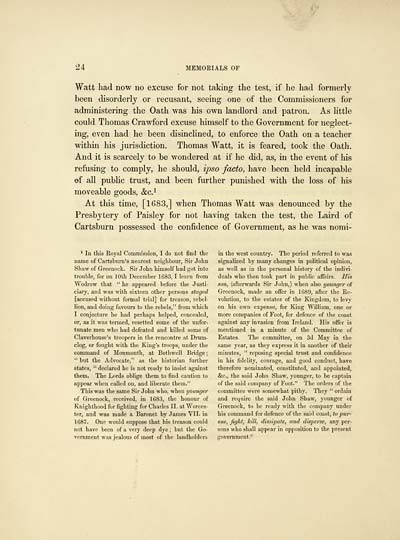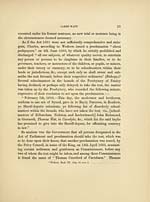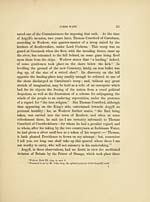Memorials of the lineage, early life, education and development of the genius of James Watt
(42) Page 24
Download files
Complete book:
Individual page:
Thumbnail gallery: Grid view | List view

24
MEMORIALS OF
Watt had now no excuse for not taking the test, if he had formerly
been disorderly or recusant, seeing one of the Commissioners for
administering the Oath was his own landlord and patron. As little
could Thomas Crawford excuse himself to the Government for neglect-
ing, even had he been disinclined, to enforce the Oath on a teacher
within his jurisdiction. Thomas Watt, it is feared, took the Oath.
And it is scarcely to be wondered at if he did, as, in the event of his
refusing to comply, he should, ipso facto, have been held incapable
of all public trust, and been further punished with the loss of his
moveable goods, &C. 1
At this time, [1683,] when Thomas Watt was denounced by the
Presbytery of Paisley for not having taken the test, the Laird of
Cartsburn possessed the confidence of Government, as he was nomi-
1 In this Royal Commission, I do not find the
name of Cartshurn's nearest neighbour, Sir John
Shaw of Greenock. Sir John himself had got into
trouble, for on 10th December 1683, 1 learn from
Wodrow that " he appeared before the Justi-
ciary, and was with sixteen other persons staged
[accused without formal trial] for treason, rebel-
lion, and doing favours to the rebels," from which
I conjecture he had perhaps helped, concealed,
or, as it was termed, resetted some of the unfor-
tunate men who had defeated and killed some of
Claverhouse's troopers in the rencontre at Drum-
clog, or fought with the King's troops, under the
command of Monmouth, at Bothwell Bridge ;
" but the Advocate," as the historian further
states, " declared he is not ready to insist against
them. The Lords oblige them to find caution to
appear when called on, and liberate them."
This was the same Sir John who, when younger
of Greenock, received, in 1683, the honour of
Knighthood for fighting for Charles II. at Worces-
ter, and was made a Baronet by James VII. in
1687. One would suppose that his treason could
not have been of a very deep dye ; but the Go-
vernment was jealous of most of the landholders
in the west country. The period referred to was
signalized by many changes in political opinion,
as well as in the personal history of the indivi-
duals who then took part in public affairs. Mis
son, (afterwards Sir John,) when also younger of
Greenock, made an offer in 1689, after the Re-
volution, to the estates of the Kingdom, to levy
on his own expense, for King William, one or
more companies of Foot, for defence of the coast
against any invasion from Ireland. His offer is
mentioned in a minute of the Committee of
Estates. The committee, on 3d May in the
same year, as they express it in another of their
minutes, " reposing special trust and confidence
in his fidelity, courage, and good conduct, have
therefore nominated, constituted, and appointed,
&c, the said John Shaw, younger, to be captain
of the said company of Foot." The orders of the
committee were somewhat pithy. They " ordain
and require the said John Shaw, younger of
Greenock, to be ready with the company under
his command for defence of the said coast, to pur-
sue, fight, kill, dissipate, and disperse, any per-
sons who shall appear in opposition to the present
government."
MEMORIALS OF
Watt had now no excuse for not taking the test, if he had formerly
been disorderly or recusant, seeing one of the Commissioners for
administering the Oath was his own landlord and patron. As little
could Thomas Crawford excuse himself to the Government for neglect-
ing, even had he been disinclined, to enforce the Oath on a teacher
within his jurisdiction. Thomas Watt, it is feared, took the Oath.
And it is scarcely to be wondered at if he did, as, in the event of his
refusing to comply, he should, ipso facto, have been held incapable
of all public trust, and been further punished with the loss of his
moveable goods, &C. 1
At this time, [1683,] when Thomas Watt was denounced by the
Presbytery of Paisley for not having taken the test, the Laird of
Cartsburn possessed the confidence of Government, as he was nomi-
1 In this Royal Commission, I do not find the
name of Cartshurn's nearest neighbour, Sir John
Shaw of Greenock. Sir John himself had got into
trouble, for on 10th December 1683, 1 learn from
Wodrow that " he appeared before the Justi-
ciary, and was with sixteen other persons staged
[accused without formal trial] for treason, rebel-
lion, and doing favours to the rebels," from which
I conjecture he had perhaps helped, concealed,
or, as it was termed, resetted some of the unfor-
tunate men who had defeated and killed some of
Claverhouse's troopers in the rencontre at Drum-
clog, or fought with the King's troops, under the
command of Monmouth, at Bothwell Bridge ;
" but the Advocate," as the historian further
states, " declared he is not ready to insist against
them. The Lords oblige them to find caution to
appear when called on, and liberate them."
This was the same Sir John who, when younger
of Greenock, received, in 1683, the honour of
Knighthood for fighting for Charles II. at Worces-
ter, and was made a Baronet by James VII. in
1687. One would suppose that his treason could
not have been of a very deep dye ; but the Go-
vernment was jealous of most of the landholders
in the west country. The period referred to was
signalized by many changes in political opinion,
as well as in the personal history of the indivi-
duals who then took part in public affairs. Mis
son, (afterwards Sir John,) when also younger of
Greenock, made an offer in 1689, after the Re-
volution, to the estates of the Kingdom, to levy
on his own expense, for King William, one or
more companies of Foot, for defence of the coast
against any invasion from Ireland. His offer is
mentioned in a minute of the Committee of
Estates. The committee, on 3d May in the
same year, as they express it in another of their
minutes, " reposing special trust and confidence
in his fidelity, courage, and good conduct, have
therefore nominated, constituted, and appointed,
&c, the said John Shaw, younger, to be captain
of the said company of Foot." The orders of the
committee were somewhat pithy. They " ordain
and require the said John Shaw, younger of
Greenock, to be ready with the company under
his command for defence of the said coast, to pur-
sue, fight, kill, dissipate, and disperse, any per-
sons who shall appear in opposition to the present
government."
Set display mode to:
![]() Universal Viewer |
Universal Viewer | ![]() Mirador |
Large image | Transcription
Mirador |
Large image | Transcription
Images and transcriptions on this page, including medium image downloads, may be used under the Creative Commons Attribution 4.0 International Licence unless otherwise stated. ![]()
| Histories of Scottish families > Memorials of the lineage, early life, education and development of the genius of James Watt > (42) Page 24 |
|---|
| Permanent URL | https://digital.nls.uk/95169958 |
|---|
| Description | A selection of almost 400 printed items relating to the history of Scottish families, mostly dating from the 19th and early 20th centuries. Includes memoirs, genealogies and clan histories, with a few produced by emigrant families. The earliest family history goes back to AD 916. |
|---|

